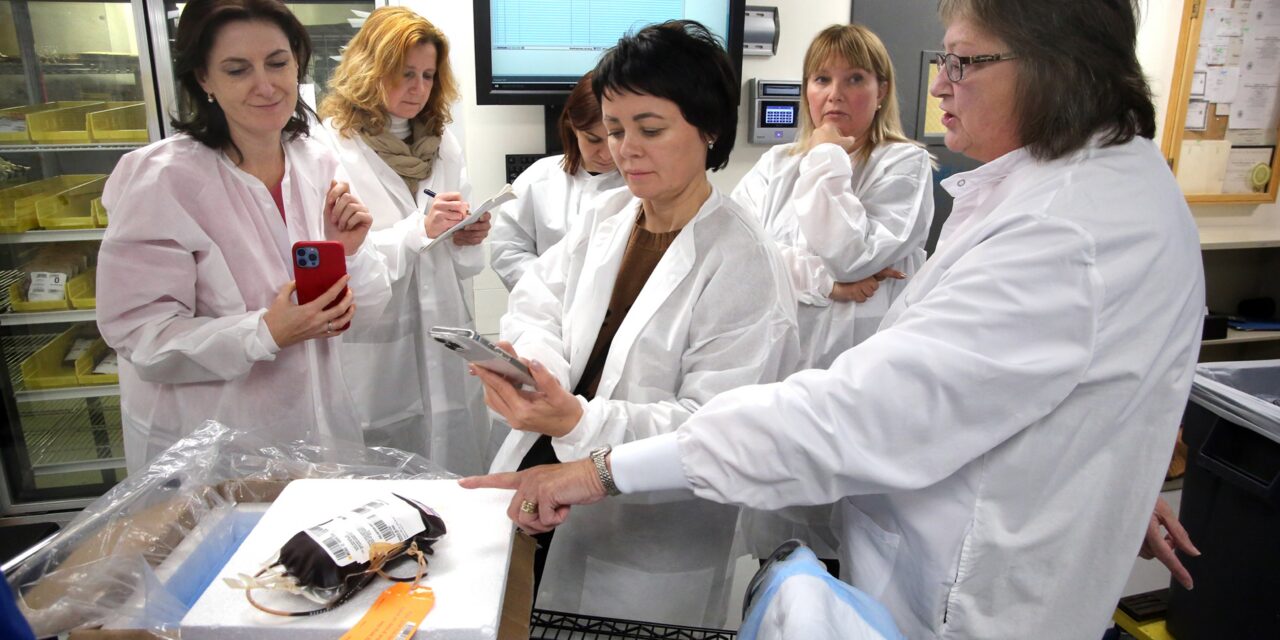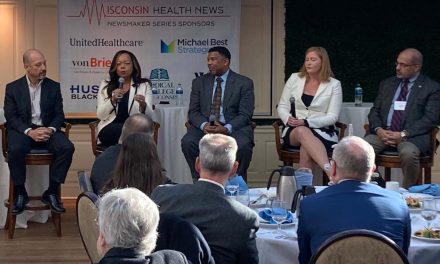
Ukrainian doctors visit Versiti

Image credit: Versiti
A delegation of Ukrainian health administrators is visiting Versiti to learn more about how they recruit donors, collect blood, process it and distribute it to their clinical partners.
The five doctors are visiting the blood services provider’s facilities in Wisconsin and Illinois. Versiti CEO Chris Miskel said the need for blood is high in Ukraine, given the invasion by Russia.
“We were very thrilled—humbled, thrilled—to be able to participate here and help in any way that we could,” he said in a Wednesday interview.
The visit comes through the Open World program, an exchange program between the U.S. and post-Soviet countries that’s administered by the Congressional Office for International Leadership. The Friendship Force of Greater Milwaukee, a volunteer group, is hosting the delegates in their homes and recommended Versiti.
Dr. Olena Frolova of the Ukrainian Transplant Coordination Center in Kyiv said the country’s blood system faces troubles as blood centers in Russian-occupied territories have fallen out of the system. Shooting and air raids pose risks, and some donors have been killed as they waited outside centers to donate.
Dr. Iryna Fedyk of the Prykarpattia Regional Blood Service Center said centers farther from the war zone are working twice as hard to supply needed blood.
Dr. Olena Malyhon, deputy medical director of the Kharkiv Regional Blood Service Center, said Ukrainian blood services adapted quickly and have been able to meet the demand. Those who are not able to fight in the war donate, she said.
“This way, they feel that they help,” she said through a translator. “They’re helping to fight.”
Malyhon’s blood center was partially destroyed by an air raid in February, so they moved its equipment to the basement to continue operating. Since her own home was destroyed, as well as those of other center workers, they sleep there during the night after working during the day.
“That’s how dedicated they are,” said Olga Dzyurak, the delegation’s translator.
Malyhon said that blood services in the Ukraine are in a state of reform, which is why they’re interested in learning more about how they’re organized in the United States.
After seeing Versiti’s work in Milwaukee, she said they were impressed by its efforts to encourage high school students to make a habit of donating blood as well as its informational services surrounding blood processing.
Fedyk said they are strong thanks to the United States for standing with them.
“This is a very important stage for us, our country, especially for the blood services in our country, and especially at the time, you know, when our country sustains such a horrible aggression,” Fedyk said through a translator. “We cannot stop. We may not stop.”
Sue Johnson, director of clinical education at Versiti, said the delegates are passionate and interested in learning about how to adopt some of the blood services provider’s processes.
“Since the war broke out, they have not had a day off,” Johnson said. “They just want to take in everything.”
Miskel said the visit is in line with collaboration between blood centers within the United States to share best practices.
“If we can impact the security of the blood supply in the Ukraine in any small way, it gets our team so inspired,” he said.
This article first appeared in the Wisconsin Health News daily email newsletter. Sign up for your free trial here.





